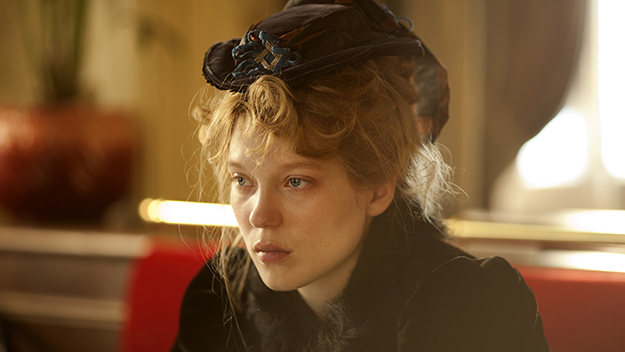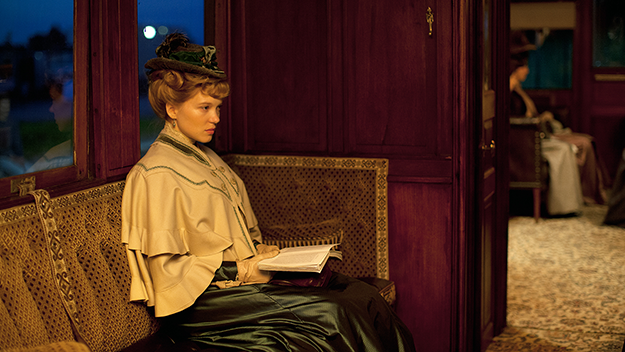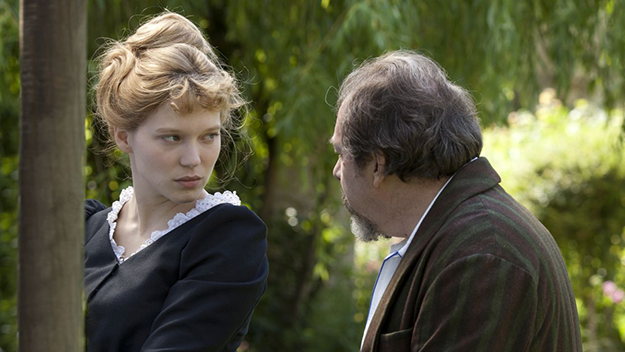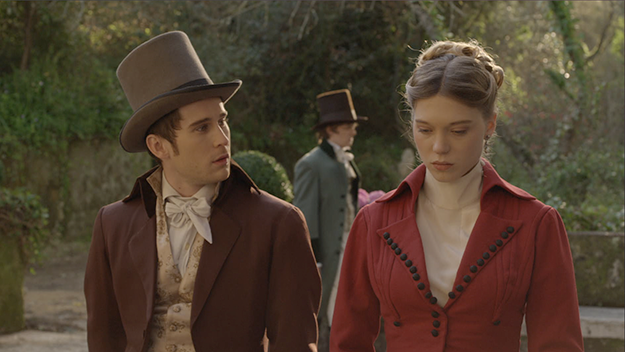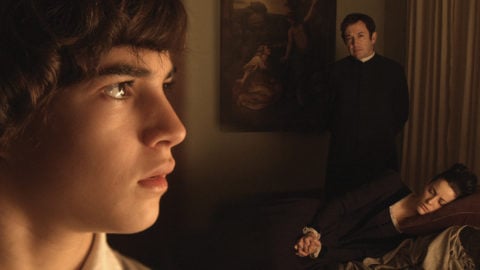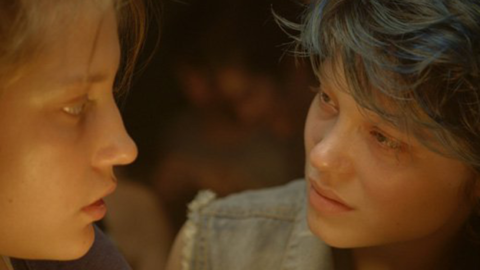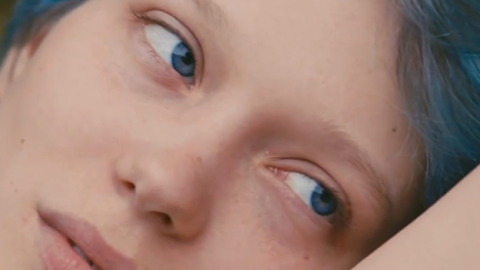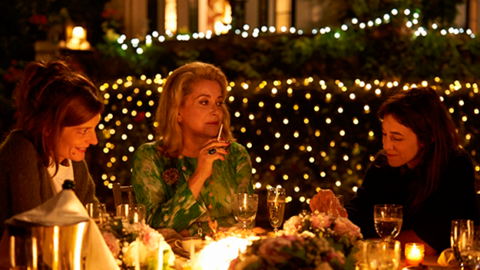Interview: Léa Seydoux
A sly, sullen lynx with airs and graces and a habit of trashing her bosses under her breath, Célestine in Benoît Jacquot’s Diary of a Chambermaid is the latest proof of Leá Seydoux’s ability to create vividly uningratiating women. Molested by too many of her masters and forced to scrub too many chamber pots, she has almost (but not quite) had her natural compassion squeezed out of her. Hence, perhaps, her taste for brutalizing sex: Seydoux recalls neither the fiery Paulette Goddard of Jean Renoir’s 1946 version nor the detached, adaptable Célestine whom Jeanne Moreau played for Luis Buñuel in 1964, but an extra-carnal amalgam of Mai Zetterling and Simone Signoret.
The troglodyte who picks this overripe plum is Vincent Lindon’s surly coachman Joseph, not only a vicious Jew-hater but a suspected child sex killer. Their coming together in crime and lust intensifies Jacquot’s allegory of Dreyfus Affair–era France’s long slide into full-blown anti-Semitism and collaborationism. Célestine’s vapid response to Joseph’s racist invective and her smiling at the Schadenfreude of the village gossips feasting on the precise details of a little girl’s rape and murder cast her as the worst kind of passive colluder.
The high-born Léa Hélène Seydoux-Fornier de Clausonne—who turns 31 on July 1—has stealthily emerged as a major French actor in the last decade, and, via Spectre (15), she’s a Bond Girl to boot. Since breaking into television and film without a modicum of help, apparently, from her paternal grandfather, Pathé chairman Jérôme, she has played an array of psychologically nuanced women. She was a modern high-school Princesse de Clèves, moody, brunette, and hopelessly seductive, in The Beautiful Person (09); forced to think on her feet as Marie-Antoinette’s reader in Jacquot’s Farewell, My Queen (12); simultaneously fierce and tender, and very touching, in Blue Is the Warmest Color (13); irradiated by desire as a sultry nuclear plant decontamination worker in Grand Central (13); and a mercurial Loulou de la Falaise in Saint Laurent (14).
An obliging voice on the phone from Paris, Seydoux confirms the rumor that she is shy in person and anxious to let bygones be bygones with regard to Abdellatif Kechiche’s demanding direction of Blue’s love scenes. Once the Diary of a Chambermaid questions were done, she became a little giggly.
Diary of a Chambermaid
I believe Benoît Jacquot wrote Célestine for you?
I don’t know if he wrote the part for me, but I know he thought of me when he was working on the script. He probably had my image in his head. It’s a character I really enjoyed playing because I love working with Benoît. There are always things to learn from him.
Was Octave Mirbeau’s 1900 novel helpful, or did you just rely upon the script?
It was helpful, but the script was a free adaptation so it was very different. I based my work on the script.
Did you look at the Renoir and Buñuel versions?
No, I didn’t watch them, because I wanted to have my own vision.
The film explores Célestine’s situation as a class victim and as a woman exploited by men, and it also shows the rise of anti-Semitism, through Joseph (Vincent Lindon). Did Jacquot talk to you about these themes or guide you more to focus on Célestine’s journey?
It’s a political film so we spoke about anti-Semitism, race, and her desire to escape from her situation, but not really about her actual journey. He doesn’t like to speak about the characters—that may be a very French thing. There is a tacit communication between us. He knows that I know. He knew that I completely felt the character and the social context. He knew that I understood the story and the subtext. It’s nice when you work with a director and you have the same vision. We never fought. We were always very fluid.
When I watched the film, I was reminded that Sidonie Laborde, your character in Farewell, My Queen, scratches her flea bites. It’s as if she’s caught between Marie-Antoinette and the Bourbons on one hand and the sans-culottes, the commoners, on the other. Célestine is similarly caught between gentility and sordidness. She fears becoming a prostitute.
She will become a prostitute.
Diary of a Chambermaid
So when Joseph suggests they go to Cherbourg and run a café for sailors, he means she should sleep with them and not just manage the other prostitutes?
I think both. She prefers to be a prostitute rather than work as a servant. She becomes her own master in a way.
You had a much more privileged upbringing than Sidonie or Célestine. Does this make it harder or easier for you to play characters who are on a lower social scale?
I love to play characters that are far from me—that have tough lives. I don’t know if it’s easier for me, or if it’s more difficult. It’s just that I feel closer to them and I prefer playing them. Some directors ask me to play bourgeoises. They think because I’m a bourgeois it is easier. They have no imagination. I mean, it can be interesting to play bourgeoises, but I’m more interested—I don’t know why—by characters that are struggling.
Madame Lanlaire (played by Clotilde Mollet) doesn’t care at all that Célestine’s mother dies, yet she’s traumatized by the theft of her silver and her heirlooms. Why do you think Célestine takes pity on her?
It’s a good question. Célestine knows she is done with her and that she is going to leave, so she becomes the very good, proper maid. She has some humanity and she accepts Madame Lanlaire with her faults. She also sees her in that big house and it’s quite sad, so it’s just a question of empathy. We can guess that no one has ever been nice to Célestine. Even Joseph is not really nice to her. But Madame Lanlaire is at the end. There’s a little complicity between them.
Célestine has power over a weak man like Monsieur Lanlaire (Hervé Pierre) but she’s attracted to men who dominate her. Do you feel she accepts the nature of her sensuality or is ambiguous about it?
I think she’s ambiguous about it, yes. She likes being attractive and playing with her sexuality a little bit. She knows it gives her some power. At the same time, she is very conscious about the fact that Joseph is a sexual pervert.
Diary of a Chambermaid
You think she believes Joseph raped and killed the young girl in the forest?
Yes.
What do you think?
Yes. I think he did it.
And she goes off with him having accepted not only that he hates Jews but that he’s a psycho?
I think she judges him, but I also think she is in love with him. And she wants to escape from Madame and Monsieur Lanlaire and their world. She wants to be free. It’s a very courageous desire.
If you look at the film objectively, don’t you think that her following Joseph makes it a tragedy—because he represents the French workingman and aspiring petit bourgeois encouraged by the Catholic church to hate France’s Jews.
I don’t think she hates the Jews or that she’s racist, but Joseph is and she knows [anti-Semitism] is terrible. Yes, it is a tragedy, but she made a choice. She’s active. She has a desire for herself, for her existence.
As the actor, you just have to focus on what she wants?
Yes.
Tell me about working with Vincent Lindon. Were you apprehensive?
Yes, because he’s also a friend. To act with a friend is always a little intimidating. But I really like him as an actor and it’s always easy to work with good actors. It makes it simpler.
Diary of a Chambermaid
Are you the kind of actor who becomes a character completely throughout the making of a film, or are you able to step away from it?
Both. I am the character as soon as I hear “Action.” But I don’t think the character comes to me. I don’t believe that it’s something you have to play. It’s inside of you. It’s just something you have to look for. I don’t really believe you create something from the outside.
You find the emotions within you?
Yes, my own emotions. But I use things—I have tricks. The costumes are important, the context, the décor, the location. Everything says something. They are like tools. You have to play with all of those things. I’m totally the character and when [a director says “Cut”], I’m myself. I’m always myself in a way.
You’ve said that you had a crisis of confidence before you made this film—that you weren’t feeling confident as an actor. Why was that?
I’m not conscious of myself when I’m acting. It’s almost like a trance. I become very focused. I concentrate a lot and lose myself. It’s like [there’s] a moment when I’m [no longer] aware of myself. I never know if I’m going to be able to do a scene [by reaching that] state of emotion. I’m always scared to be in that situation.
How do you reflect now on the whole Blue Is the Warmest Color experience? [Seydoux and co-star Adèle Exarchopoulos were critical of director Abdellatif Kechiche’s exacting working methods, especially on a long sex scene.]
I’m very happy about that experience in the way that it was so unique. The way Kechiche worked, the way he shot. It was so special—it was also crazy. It was interesting as an actor. It was a real experience, almost an existential experience. It was very intense, it was hard, it was brutal, but I think it was interesting. It was not for nothing. We made a great film and I feel it was a special moment in my life. I’m proud of what was done and I’m proud of the film. For me it’s positive even if it was difficult.
What do you think is the major difference between working with American and French directors?
It’s very different because the French are much more cerebral. American or British movies are more about entertainment. The acting is more physical.
Mysteries of Lisbon
Did you have a good experience working with Raoul Ruiz on Mysteries of Lisbon [10]?
Yes. It was very short. I worked for three days. I was very happy to meet him. He died a few months after shooting.
It’s a masterpiece—and you’re a tragic lady in that one!
Yes, but the part is so small.
What about working with Quentin Tarantino on Inglourious Basterds?
It was great, too. Very fun. [Laughs]
Do you ever think about playing classic French literary characters like Marguerite Gautier from The Lady of Camellias or Emma Bovary, or do you think it’s more important to create new characters?
I don’t know. I like to create my own characters, and also I should try to play famous characters. I’ve never really tried, actually.
You’d be a fascinating Madame Bovary.
Ah, thank you. Maybe one day.
Which actors have influenced you?
Marlon Brando.
Really?
Yes. Marlon Brando is my model. [Laughs]
Graham Fuller is a freelance film critic based in New York.



